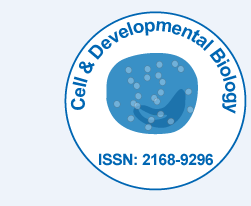
Cell & Developmental Biology
Open Access
ISSN: 2168-9296

ISSN: 2168-9296
Short Communication - (2024)Volume 13, Issue 3
Fluid-phase endocytosis is a fundamental cellular process that plays an important role in maintaining cellular homeostasis by facilitating the uptake of nutrients, growth factors, and other essential molecules from the extracellular environment [1]. This mechanism, also known as pinocytosis, involves the non-selective internalization of extracellular fluid and solutes by cells, contributing to their metabolic needs and overall function. In this article, we will explore the role of fluid-phase endocytosis in nutrient uptake and its significance for cellular homeostasis.
Mechanism of fluid-phase endocytosis
Fluid-phase endocytosis involves the invagination of plasma membrane regions, leading to the formation of small vesicles called pinosomes [2]. Unlike receptor-mediated endocytosis, which requires specific ligands to bind to cell surface receptors, fluid-phase endocytosis occurs spontaneously and does not involve receptor-ligand interactions. Once formed, pinosomes undergo intracellular trafficking, ultimately fusing with endosomes and lysosomes for cargo degradation or recycling.
Regulation of fluid-phase endocytosis
The process of fluid-phase endocytosis is tightly regulated to ensure efficient nutrient uptake and cellular homeostasis. Several factors influence the rate and extent of fluid-phase endocytosis, including cell type, extracellular nutrient availability, and signaling pathways [3]. For example, growth factors such as insulin and Epidermal Growth Factor (EGF) can stimulate fluid-phase endocytosis by activating downstream signaling cascades that promote membrane invagination and vesicle formation. Conversely, cellular stressors or metabolic imbalances may inhibit fluid-phase endocytosis to conserve energy and maintain cellular integrity. Understanding the regulatory mechanisms governing fluid-phase endocytosis is essential for elucidating its physiological roles and potential therapeutic applications.
Nutrient uptake: One of the primary functions of fluid-phase endocytosis is the uptake of nutrients from the extracellular environment. Cells utilize this mechanism to acquire essential macromolecules, including proteins, lipids, carbohydrates, and micronutrients such as vitamins and minerals. For example, extracellular proteins can be internalized through fluid-phase endocytosis, allowing cells to access amino acids for protein synthesis and energy production. Similarly, lipids and cholesterol are taken up via fluid-phase endocytosis, contributing to membrane remodeling and lipid metabolism [4].
Cellular homeostasis: Fluid-phase endocytosis plays an important role in maintaining cellular homeostasis by regulating the intracellular concentration of nutrients and signaling molecules. By continuously sampling the extracellular environment, cells can adjust their nutrient uptake in response to changing metabolic demands and environmental cues. This dynamic regulation ensures that cells have access to sufficient nutrients to support growth, proliferation, and survival while preventing nutrient overload or depletion [5].
Adaptation to nutrient availability: Cells can adapt their fluidphase endocytic activity in response to changes in nutrient availability and metabolic status. During periods of nutrient scarcity, cells may upregulate fluid-phase endocytosis to increase the uptake of available nutrients and promote survival. Conversely, under nutrient-rich conditions, cells may downregulate fluid-phase endocytosis to prevent nutrient excess and maintain metabolic balance. This adaptive response enables cells to optimize nutrient utilization and energy production in diverse physiological contexts [6].
Role in signal transduction: In addition to nutrient uptake, fluid-phase endocytosis plays a potential role in signal transduction by internalizing and processing extracellular signaling molecules. Growth factors, cytokines, and hormones present in the extracellular environment can be internalized via fluid-phase endocytosis, allowing cells to regulate their response to these signals. Internalized signaling molecules can activate intracellular signaling pathways, leading to changes in gene expression, cell proliferation, and differentiation, thereby influencing cellular homeostasis and tissue function [7,8].
Implications for disease: Dysregulation of fluid-phase endocytosis has been implicated in various diseases, including metabolic disorders, cancer, and neurodegenerative diseases [9]. Alterations in nutrient uptake via fluid-phase endocytosis can disrupt cellular metabolism and contribute to metabolic imbalances associated with obesity, diabetes, and cardiovascular diseases. Moreover, aberrant fluid-phase endocytosis has been observed in cancer cells, where it can promote nutrient acquisition, tumor growth, and metastasis. Understanding the molecular mechanisms underlying fluid-phase endocytosis may provide insights into disease pathogenesis and identify potential therapeutic targets for intervention [10].
Fluid-phase endocytosis is a critical cellular process that contributes to nutrient uptake and cellular homeostasis. By enabling the non-selective internalization of extracellular fluid and solutes, fluid-phase endocytosis allows cells to acquire essential nutrients and signaling molecules from the extracellular environment. This mechanism plays a vital role in regulating cellular metabolism, growth, and survival, and its dysregulation has been implicated in various diseases. Further research into the molecular mechanisms underlying fluid-phase endocytosis may lead to the development of novel therapeutic strategies for metabolic disorders, cancer, and other diseases associated with altered nutrient uptake and signaling.
[Crossref] [PubMed] [Google Scholar]
[Crossref] [PubMed] [Google Scholar]
[Crossref] [PubMed] [Google Scholar]
[Crossref] [PubMed] [Google Scholar]
[Crossref] [PubMed] [Google Scholar]
[Crossref] [PubMed] [Google Scholar]
[Crossref] [PubMed] [Google Scholar]
[Crossref] [PubMed] [Google Scholar]
[Crossref] [PubMed] [Google Scholar]
[Crossref] [PubMed] [Google Scholar]
Citation: Tran ZG (2024) Fluid-Phase Endocytosis: Role in Nutrient Uptake and Cellular Homeostasis. Cell Dev Biol. 13:344.
Received: 30-Apr-2024, Manuscript No. CDB-24-31244; Editor assigned: 03-May-2024, Pre QC No. CDB-24-31244 (PQ); Reviewed: 17-May-2024, QC No. CDB-24-31244; Revised: 24-May-2024, Manuscript No. CDB-24-31244 (R); Published: 31-May-2024 , DOI: 10.35248/2168-9296.24.13.344
Copyright: © 2024 Tran ZG. This is an open-access article distributed under the terms of the Creative Commons Attribution License, which permits unrestricted use, distribution and reproduction in any medium, provided the original author and source are credited.